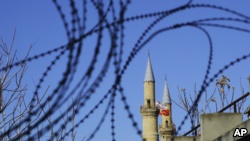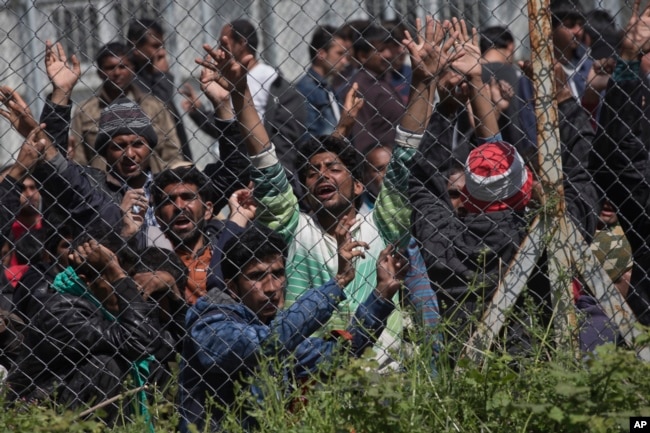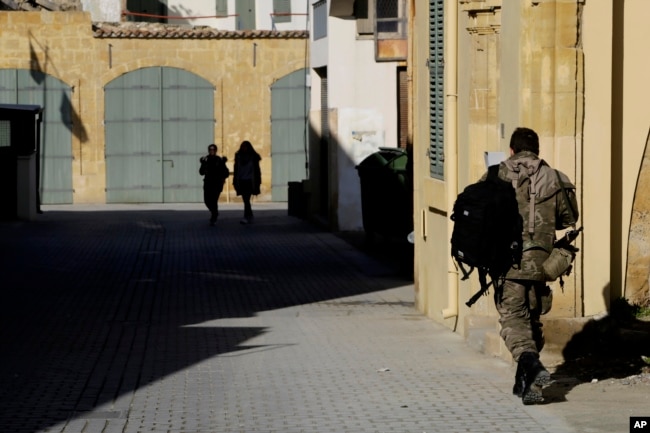 February 10, 2017 3:17 PM
February 10, 2017 3:17 PM
FILE – Turkish and Turkish Cypriot breakaway flags flying on the minarets of the Selimiye mosque or Agia Sofia, are seen through the barbed wires of the U.N. buffer zone that divides the Greek and Turkish Cypriots controlled areas, in the divided capital of Nicosia, Cyprus, Jan. 12, 2017.
The recent trouble took place after a Turkish naval vessel carrying Chief of Staff General Hulusi Akar visited the area, prompting Greece to send ships to shadow the Turkish boats. Athens accused Turkish fighter jets of violating its airspace a record 138 times in one day.
The standoff did not result in a military confrontation. As Turkish political columnist Semih Idiz of Al Monitor website says, both sides have experience at containing tensions over territorial disputes.
“We’ve had many of these storms in teacups; they can be very serious storms in the Aegean,” Idiz said. “I am not trying to underestimate them or trying to approach it lightly, and a mishap could lead to a situation that is undesirable; but, generally I think the two sides, after a certain escalation, draw back in incidents like this. This has been the pattern between Turkey and Greece.”
The outbreak in high seas tensions was widely seen as a thing of the past, with nearly two decades of rapprochement efforts.
“These events underline the wrong assumption that full normalization still has not been achieved between Turkey and Greece,” warned analyst Sinan Ulgen, a visiting scholar of the Carnegie Institute in Brussels. “These latest events reveal how resolved disputes can erupt again.”

FILE – Migrants, most of them from Pakistan, protest against the EU-Turkey deal about migration inside the entrance of Moria camp in the Greek island of Lesbos, April 5, 2016.
Refugee factor
Ulgen suggests the catalyst for the latest outbreak in tensions was a Greek court’s refusal last month to extradite eight Turkish soldiers wanted by Ankara for their alleged role in a failed July coup. Following the decision, Turkish Foreign Minister Mevlut Cavusoglu warned of severe consequences. Ulgen says repercussions are still possible, even if a military showdown is avoided.
“The problems in the Greek-Turkish bilateral relationship have the potential to undermine also the refugee deal, which is of consequence to many European governments including Germany,” warned Ulgen. “The other area where a deterioration of this relationship may have a negative impact is Cyprus.”
German Chancellor Angela Merkel visited Ankara recently for talks.
One item on her agenda was the assurance over the continuation of Turkey’s deal with the European Union to stem the flow of migrants. Analysts predict Ankara will not end the deal because of tensions with Athens, as the issue is one of the few sources of leverage Ankara has over Brussels.

FILE – A Greek Cypriot soldier (R) walks towards a military guard post across the U.N. buffer zone that divides the Greek and Turkish Cypriots controlled areas, in the divided capital of Nicosia, Cyprus, Jan. 12, 2017.
Reunification efforts
United Nations efforts to reunite the island of Cyprus, divided between Greek and Turkish-Cypriot communities, could be hurt.
“The two sides in Cyprus have brought it up to a certain point, now they need their big brothers to iron out differences,” noted columnist Idiz, “and any tensions between Turkey and Greece would automatically have a negative effect on any progress being made on Cyprus, so there is that risk.”
Last month, United Nations-sponsored reunification talks in Geneva ended in deadlock.
U.N. Secretary-General Antonio Guterres visited Istanbul on Friday for two days of discussions, including with Turkish Prime Minister Binali Yildirim. However, with Turkish President Recep Tayyip Erdogan campaigning on a platform of nationalism ahead of an April referendum to extend his powers, analysts warn a tough line toward Athens and over Cyprus is likely, at least until the vote.
“We began to hear once more, the same damn arguments, the ones we used to hear before 2004, how strategically important is Cyprus, that Turkey would be surrounded,” said international relations expert Soli Ozel of Istanbul’s Kadir Has University. “This is not only coming from government circles, or their supporters, but the old nationalists are back, so I think the real problem is going to be Cyprus, which only two months ago everybody thought was going to be resolved.”
Cyprus has been divided since Turkish forces invaded in 1974 in response to a short-lived coup by Greek Cypriot militants seeking union with Greece.
http://www.voanews.com/a/cyprus-renewed-turkey-greece-tensions/3718272.html



